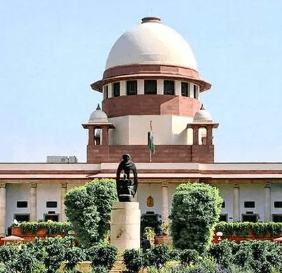SC to take 'in-chamber' decision on listing of plea challenging Article 35-A
The Supreme Court has announced that it would take ‘in-chamber’ decision on listing of plea challenging Article 35-A.
‘In-chamber’ decision refers to a process of decision making where the orders are issued from the Justice’s chambers without a formal court proceeding.
Article 35A of the Indian Constitution
Article 35A empowers the Jammu and Kashmir Legislature to decide who all are ‘permanent residents’ of the State and confer on them special rights and privileges in public sector jobs, acquisition of property in the State, scholarships and other public aid and welfare.
Genesis of the Article 35A
Article 35A was incorporated into the Constitution in 1954 by an order of the then President Rajendra Prasad on the advice of the Jawaharlal Nehru Cabinet.
The Article 35A was incorporated based on the 1952 Delhi Agreement entered between then Prime Minister Jawaharlal Nehru and the then Prime Minister of Jammu and Kashmir Sheikh Abdullah. The agreement extended Indian citizenship to the ‘State subjects’ of Jammu and Kashmir.
The Presidential order was issued under Article 370 (1) (d) of the Constitution which allows the President to make certain “exceptions and modifications” to the Constitution for the benefit of ‘State subjects’ of Jammu and Kashmir.
What is the matter before the Supreme Court?
A petition has been filed by NGO ‘We The Citizens” challenging the constitutional validity of both Article 35A and Article 370. The arguments made are:
- Four representatives from Kashmir were part of the Constituent Assembly involved in the drafting of the Constitution and the State of Jammu and Kashmir was never accorded any special status in the Constitution.
- Article 370 was only a ‘temporary provision’ to help bring normality in Jammu and Kashmir and strengthen democracy in that State.
- Constitution-makers did not intend Article 370 to be a tool to bring permanent amendments, like Article 35A, in the Constitution
- Article 35 A is against the very spirit of oneness of India as it creates a class within a class of Indian citizens.
- Restricting citizens from other States from getting employment or buying property within Jammu and Kashmir is a violation of fundamental rights under Articles 14, 19 and 21 of the Constitution.
Petitions have also been filed by NGO, ‘Ikkjut Jammu’ and Jammu and Kashmir native Charu Wali Khanna questioning the constitutional validity of Article 35A.
The State government is defending the Article 35A citing two verdicts of the constitution benches of the Supreme Court in 1961 and 1969, which had upheld the powers of the President under Article 370(1)(d) of the Constitution to pass constitutional orders.
Month: Current Affairs - January, 2019



